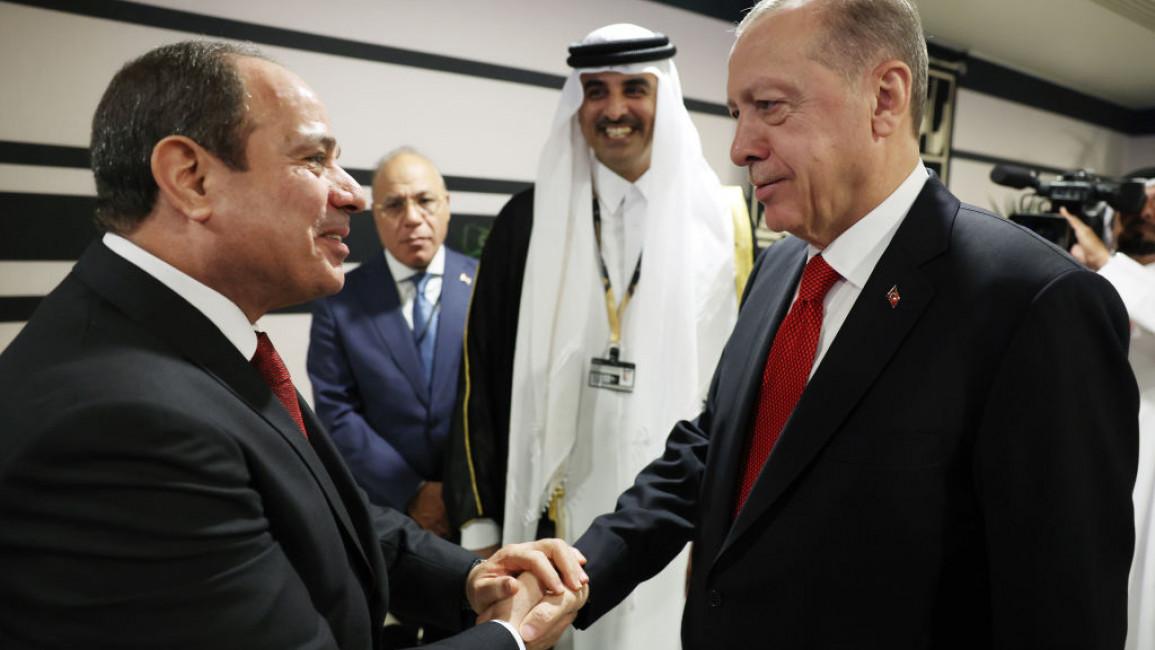
Why Egypt and Turkey are ending a decade of tension

On 14 February, Turkish President Recep Tayyip Erdogan and his Egyptian counterpart Abdel Fattah el-Sisi met at the Al-Ittihadiya Palace in Cairo. This marked Erdogan’s first visit to Egypt since 2012.
The visit was an important watershed in Ankara and Cairo’s rapprochement that gained momentum after the two leaders met in Qatar at the 2022 FIFA World Cup.
In the Egyptian capital, Erdogan and Sisi addressed a host of issues, including bilateral trade, energy, and the Libyan file. The two leaders called for “a new stage in relations” and for bilateral trade to increase to $15 billion per year “within a few years”.
But the Israeli war on Gaza and the worsening humanitarian crises in the besieged enclave topped the agenda.
“We will continue to cooperate and stand in solidarity with our Egyptian brothers to put an end to the bloodshed in Gaza,” said Erdogan at a joint press conference with Egypt’s head of state.
The Turkish president also added that Ankara remains determined to engage in further dialogue with Cairo to promote peace and security throughout the Middle East.
"In recent years, Ankara and Cairo were opposing stakeholders in many regional conflicts and disputes, from Libya to Syria and the 2017-21 Gulf Cooperation Council crisis"
Moving past years of tension
Only a few years ago the level of tension between the two countries was extremely high. Ankara and Cairo were opposing stakeholders in many regional conflicts and disputes, from Libya to Syria and the 2017-21 Gulf Cooperation Council (GCC) crisis.
Turkey’s pro-Muslim Brotherhood foreign policy, which entailed staunchly opposing the Egyptian coup of 2013 that ousted Mohammed Morsi and his party from power, prompted the Sisi regime in Cairo to join other Arab states in viewing Turkey as a grave threat.
In particular, the Turkish media landscape gave platforms to many exiled Egyptian Islamists who spoke out against Sisi’s government and challenged its legitimacy on a daily basis. Meanwhile, in Egypt’s media, Turkey and Qatar were constantly vilified and blamed for terrorism and extremism in the Arab-Islamic world.
Yet, Ankara and Cairo eventually came around to seeing reconciliation as serving the interests of both countries. The Turkish government assessed the costs which Ankara had to pay for being so involved in various regional conflicts on the side of Muslim Brotherhood-affiliated groups and concluded that pursuing a more transactional and less ideational foreign policy in the Middle East would be most pragmatic.
Since the 2020-22 period, Turkey has focused much more on pursuing opportunities in the domains of trade, commerce, investment, and defence deals rather than standing up for certain causes that Ankara believed it needed to defend during the Arab Spring period.
Within this wider context, Turkey’s relationship has also significantly improved with Saudi Arabia and, even more so, with the United Arab Emirates (UAE) throughout these past few years.
Although Cairo does not have the deep pockets that Riyadh and Abu Dhabi do, Egypt’s geography is one major factor that makes the country valuable to Ankara. Turkey sees Egypt as a gateway to the rest of Africa. Thus, as Ankara seeks to become more of a player in the Sahel and other parts of Africa, Turkey believes that better relations with Cairo are important to making more inroads and growing its clout across the continent.
Egypt, for its part, has vested interests in advancing its rapprochement with Turkey. Mindful of the fact that the deteriorating Egyptian economy is on life support, Sisi’s government seeks to benefit from deeper trade, investment, and commercial relations with Turkey - an economic powerhouse in the eastern Mediterranean.
|
|
At the same time, against the backdrop of some tension between Egypt and the UAE over the 2023/24 Sudanese crisis and the Grand Ethiopian Renaissance Dam (GERD) dispute, Cairo sees the fast pace of the Abu Dhabi-Ankara rapprochement and does not want Egypt to be left behind when it comes to taking advantage of better relations with Turkey.
Not lost in the equation are drone sales. Ten days before Erdogan visited Cairo, Turkish authorities agreed to provide Egypt with its drones, which have been impactful in a host of conflicts (Azerbaijan, Ethiopia, Libya, Syria, Ukraine, etc.) in recent years.
“Normalisation in our relations is important for Egypt to have certain technologies. We have an agreement to provide (Egypt) unmanned air vehicles and other technologies,” said Turkey’s Foreign Minister Hakan Fidan on 4 February.
"Improvements in Ankara-Cairo relations need to be, at least partly, understood within the grander geopolitical context, as US influence in the Middle East continues to steadily decline while the world becomes more multipolar"
War in Gaza
From a timing standpoint, the main reason why Erdogan’s visit to Cairo was significant was the ongoing Israeli war on Gaza. Many Turks are sensitive to Palestinian suffering in Gaza and, naturally, domestic opinion on the Palestinian issue will influence Turkey’s foreign policy concerning Israel’s criminal behaviour in Gaza.
Within the context of the current conflict, policymakers in Ankara understand the importance of coordination with Cairo. Egypt has unique forms of influence vis-à-vis Gaza. These are rooted in history, the fact that Egypt is the only Arab country to share a land border with Gaza, the Sisi government’s relationships with both Israel and Hamas, as well as Egypt’s traditional leadership position in the wider Arab world.
“Both countries share a similar position on Gaza. But Egypt has proven to be more important, and Turkey feels left out of the process. By approaching Egypt, Erdogan may hope to get a seat at the negotiating table. This is not only political,” said Dr Salim Cevik, an associate at the Center for Applied Turkey Studies, housed within the German Institute for International and Security Affairs, in an interview with The New Arab.
“Turkey also wants a role in the reconstruction of Gaza. From the Egyptian perspective, hosting Erdogan, one of the loudest pro-Palestinian voices in the international arena, is a sign of pro-Palestinian solidarity,” added Dr Cevik.
“Turkey sees an important opportunity to deal itself into the game currently being played in the region - the diplomatic and economic game involving the future of Gaza, its lucrative reconstruction, and a possible future settlement of the Palestine-Israel conflict,” Charles Dunne, a former US diplomat who served in Cairo and Jerusalem and is now a non-resident scholar at the Middle East Institute, told TNA.
“To do that, Erdogan knows he has to make nice with Egypt, with which he’s had difficult relations since the 2013 coup against Mohammed Morsi and the Muslim Brotherhood, with whom he was politically aligned. Thus, the Erdogan visit to Egypt was something of a breakthrough, and if it is followed by sustained diplomacy, could result in an interesting realignment of influence.”
|
|
The wider geopolitical picture
Improvements in Ankara-Cairo relations need to be, at least partly, understood within the grander geopolitical context. Washington’s influence in the Middle East continues to steadily decline while the world becomes more multipolar. As a result, countries such as Turkey and Egypt are left with no choice but to reassess their own foreign policies in their neighbourhood.
“I personally think that Erdogan is trying to take advantage of perceived disarray, and possibly waning influence, in US foreign policy toward the region, as the Biden administration faces repeated rejections from Netanyahu of the president's ceasefire ideas and concepts for a political horizon. That provides openings for other powers, particularly regional powers, to step in, and Turkey wants to be part of that,” explained Dunne.
The former US diplomat believes that Ankara currently senses a “regional political realignment” that gives Turkey an opportunity to fill somewhat of a void left by the US.
"The Erdogan visit to Egypt was something of a breakthrough, and if it is followed by sustained diplomacy, could result in an interesting realignment of influence"
“If Erdogan can let bygones be bygones, as far as the Muslim Brotherhood is concerned, and work out its power relationship with Egypt in a mutually beneficial way, this could create a new political reality in the region that both the United States and Israel will have to accommodate,” said Dunne.
As the dynamics in the region and Turkey-Egypt relations continue evolving, the ongoing reconciliation process between these two countries will likely remain a work in progress.
There is a genuine desire in both Ankara and Cairo to see bilateral ties strengthen. However, the problems that built up after the Arab Spring created significant distrust that will not disappear overnight.
The situation in Libya may prove to be one of the sensitive issues in Turkey and Egypt’s relationship. This file can “pose significant challenges to cooperation,” Francesco Salesio Schiavi, an Italian Middle East expert and analyst, told TNA.
“The prospect of a reciprocal visit by President el-Sisi and the potential impact of developments in Libya on bilateral ties are yet to unfold. Over the past decade of strained relations, a profound crisis of trust has emerged, presenting a formidable obstacle to reconciliation,” he added.
“Both parties are actively striving to overcome this barrier; Turkey’s willingness to supply Egypt with defence industry equipment and technology reflects efforts to bridge this trust deficit.”
Giorgio Cafiero is the CEO of Gulf State Analytics.
Follow him on Twitter: @GiorgioCafiero




